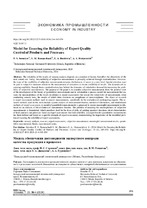| dc.contributor.author | Serenkov, P. S. | |
| dc.contributor.author | Romanchack, V. M. | |
| dc.contributor.author | Davidova, E. A. | |
| dc.contributor.author | Hurynovich, A. A. | |
| dc.coverage.spatial | Минск | ru |
| dc.date.accessioned | 2024-08-08T13:41:18Z | |
| dc.date.available | 2024-08-08T13:41:18Z | |
| dc.date.issued | 2024 | |
| dc.identifier.citation | Model for Ensuring the Reliability of Expert Quality Control of Products and Processes = Модель обеспечения достоверности экспертного контроля качества продукции и процессов / P. S. Serenkov [et al.] // Наука и техника. – 2024. – № 4. – С. 345-354. | ru |
| dc.identifier.uri | https://rep.bntu.by/handle/data/147695 | |
| dc.description.abstract | The reliability of the results of sensory analysis depends on a number of factors that affect the objectivity of the tests carried out. Today, the credibility of subjective measurements is primarily achieved through standardization. However, the issue of the credibility of subjective measurements remains, furthermore, it moves to a new level. Special attention must be paid to subjective measures related to the measurement of sensations to ensure credibility of results. The dynamics of increasing credibility through factor standardization lags behind the dynamics of stakeholder demand for increasing the credibility of subjective measurements. The purpose of the paper is to consider subjective measurements from the point of view of the development of the theory of quantitative measurements and to substantiate a process model for measurement that ensures the meaningfulness of the results in relation to expert assessments that ensure the subjectivity of measurements when conducting sensory tests, the results of which form decisions on compliance or non-compliance. The object of research is expert assessment methods used in sensory measurements, specifically in the evaluation of participating experts. The research methods used in this work include system analysis of measurement theories, method of alternatives, and standardized methods of expert assessment. A model of quantitative measurements is proposed to ensure meaningful measurement results, based on an analysis of the evolution of measurement theories. The problem of ensuring the meaningfulness of subjective measurements is formulated, which manifests itself in the form of risks of making incorrect decisions about characteristics of food products and processes based on expert assessments that lack reliability. An algorithm for quantitative measurements has been defined and tested on a specific example of expert assessment, demonstrating the importance of the identified problem of ensuring the reliability of expert assessments. | ru |
| dc.language.iso | en | ru |
| dc.publisher | БНТУ | ru |
| dc.title | Model for Ensuring the Reliability of Expert Quality Control of Products and Processes | ru |
| dc.title.alternative | Модель обеспечения достоверности экспертного контроля качества продукции и процессов | ru |
| dc.type | Article | ru |
| dc.identifier.doi | 10.21122/2227-1031-2024-23-4-345-354 | |
| local.description.annotation | Достоверность результатов органолептического анализа зависит от ряда факторов, влияющих на объективность проводимых испытаний. Повышение достоверности субъективных измерений обеспечивается сегодня главным образом за счет их стандартизации. Однако проблема достоверности субъективных измерений остается, мало того, переходит на новый уровень. Субъективные измерения, связанные с измерением ощущений, требуют особого внимания в контексте достоверности результатов. Динамика повышения достоверности за счет стандартизации факторов отстает от динамики спроса заинтересованных сторон на повышение достоверности субъективных измерений. Цель работы – рассмотреть субъективные измерения с точки зрения развития теории количественных измерений и обосновать модель процесса измерений, обеспечивающую осмысленность результатов в отношении экспертных оценок, обеспечивающих субъективность измерений при проведении органолептических испытаний, по результатам которых формируются решения о соответствии или несоответствии. Объектом исследований являются методы экспертного оценивания, используемые в органолептических измерениях и, в частности, при оценке экспертов, принимающих в них участие. В работе использованы методы исследований: системный анализ теорий измерений, метод альтернатив, стандартизованные методы оценки экспертов. По результатам анализа эволюции развития теорий измерений предложена модель количественных измерений, обеспечивающая осмысленность результатов измерений. Сформулирована проблема обеспечения осмысленности субъективных измерений, проявляющаяся в виде рисков принятия некорректных решений в отношении характеристик пищевой продукции и процессов по результатам экспертного оценивания в силу их недостаточной достоверности. Определен алгоритм количественных измерений, апробированный на конкретном примере экспертного оценивания, демонстрирующий значимость установленной проблемы обеспечения достоверности экспертных оценок. | ru |

